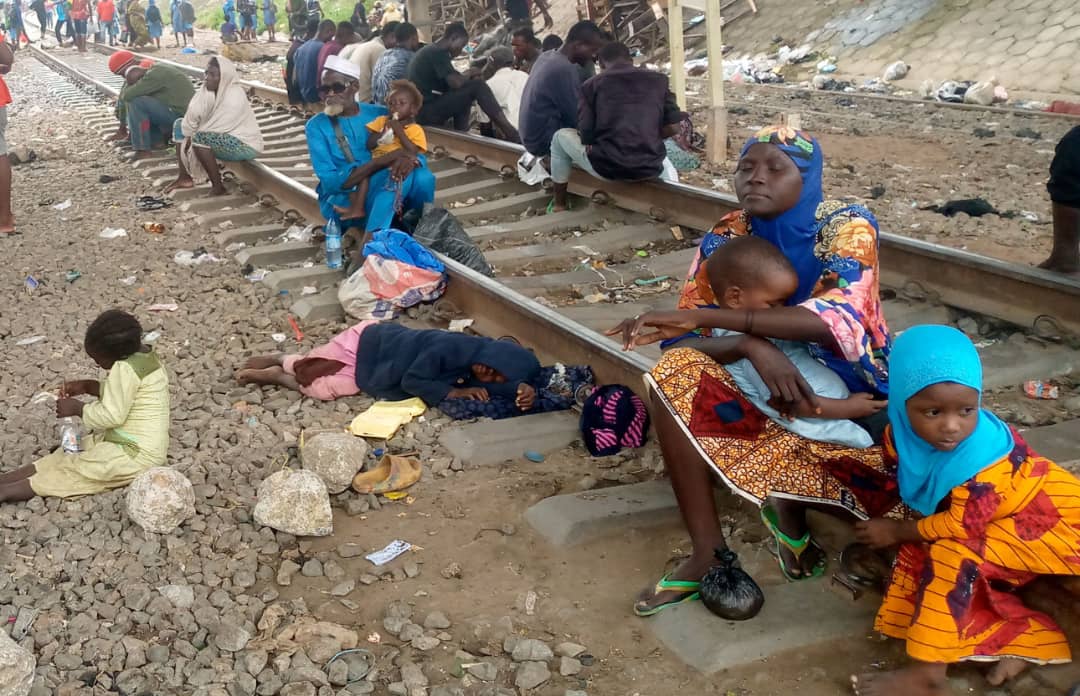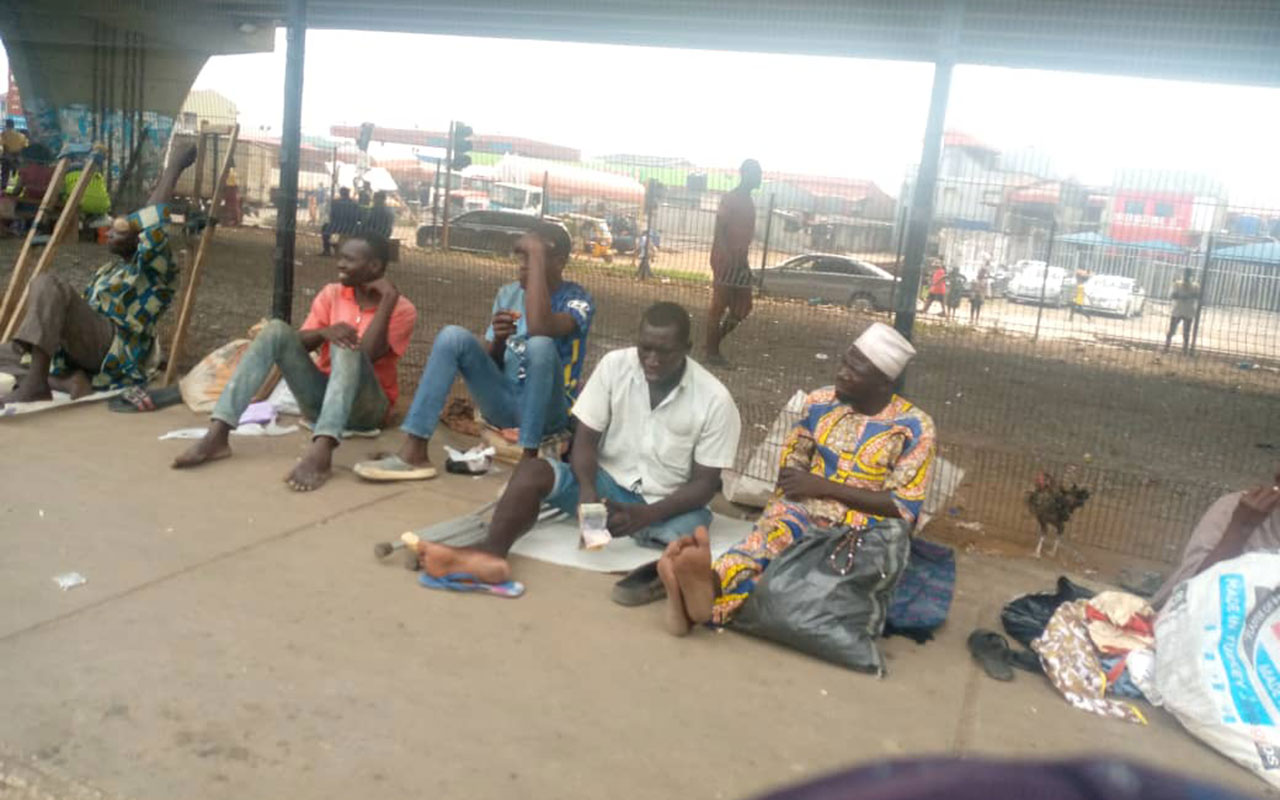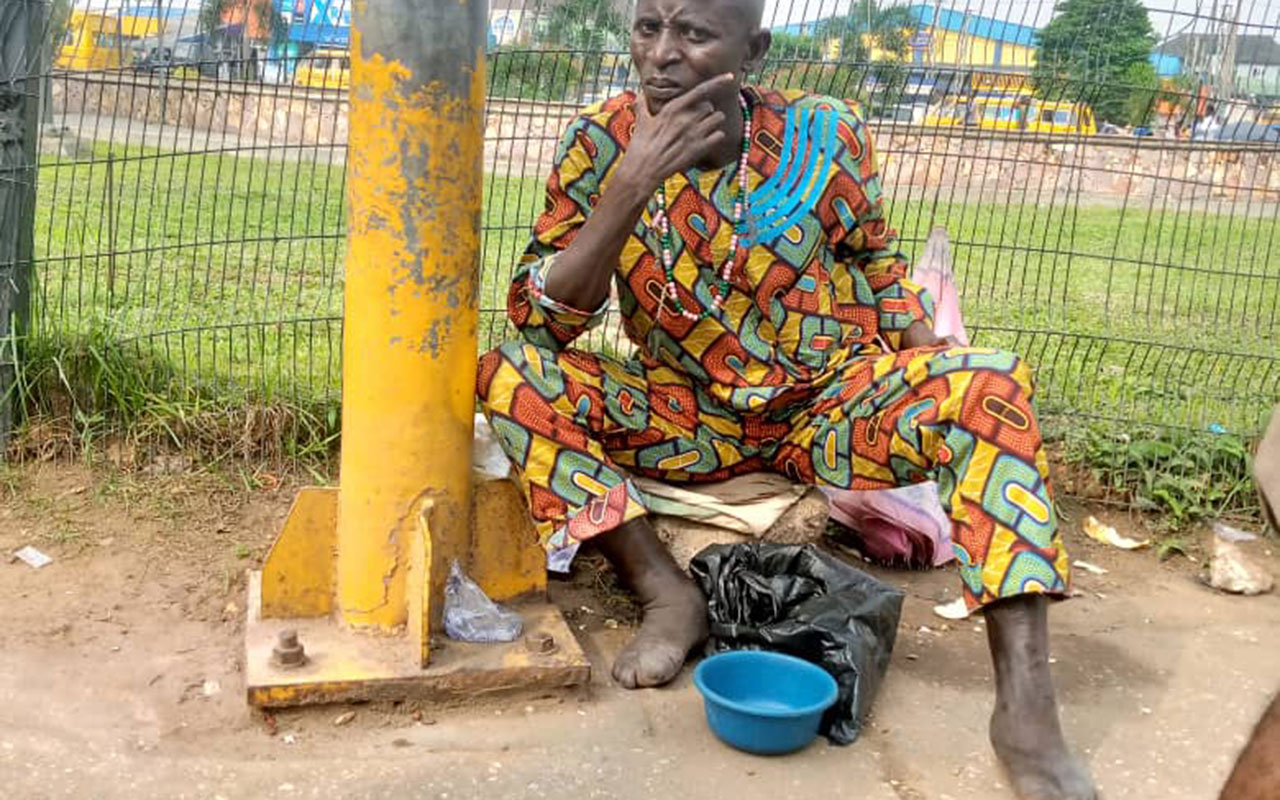 • How ‘Distasteful’ Practice Overrun Lagos Streets, Markets, Parks
• How ‘Distasteful’ Practice Overrun Lagos Streets, Markets, Parks
• For Beggars, Opportunities Abound In Lagos More Than Other States — Sociologist
A day with ‘beggars’ could be funny and seamy. You get to see all stuffs: They are humans and have the same mental disposition as every other person. They are filled with pains when people look down on them and happy when genuinely treated like human beings.
A day with beggars could take you to Ikorodu roundabout and from there to Mile 12, sometimes, Ketu and Oshodi. You, perhaps, relax for another day, this time, taking a detour movement to Agege, Iyana Ipaja, opposite Ikotun Igando BRT Bus Stop, Berger area of Ojodu, Alaba Rago and LASU/Iyana Iba axis. There are lots of places to see them: Mile 2 – Badagry Expressway, Lekki Expressway by Jakande Junction, as well as… other popular spots, where they ply their “trade”.
This sunny day, Ojota is the starting point. I stood for some minutes by the foot of Ojota pedestrian bridge. Like a predator, my gaze was sharp trying to make a perfect catch. I studied everyone that walked by. My mind eye spotted this tall, clean looking middle-aged man. He wore a blue coat, not suit.
He had a brown leather bag beaten by weather. So, it had lost a considerable part of its brownness.
He gave his name as Segun but he could be anything else. The day before, when he was spotted at Ijesha bus-stop, he was Tayo and he had a family that was starving. Today, his wife is in the hospital and just put to bed and needed blood because of complications arising from the childbirth.
“Begging is better than stealing. There is dignity in begging, but not in stealing,” he told The Guardian.
Segun, as he called himself, said, “when you’re caught stealing, people ask you did you beg and you were not given?”
Segun, who was working before he lost his job, said begging was the last option he considered, but has now become a part of him. “I always looked forward to it.”
Adeyinka Abigail who was seen at under bridge Iyana Ipaja said, “I have two kids. One is seven years old and the other is four. I stand under bridge here to beg people passing for money to feed my kids as I have no other work I do. Sometimes, I will go to Oshodi to beg for money, sometimes, I go to Egbeda and other times, to Abule Egba.”
She said, “some days I make about N3,000 daily, from which I feed my two kids and save the remaining money for the days I won’t see anybody to give me money. I have been doing this begging for three months now?”
How soon is she going to quit?
She smiled, “very soon.”
Abigail’s very soon could be any time when fortune smiles on her. She is praying fervently for this.
Another beggar at Oshodi Terminal 1 who refuses to disclose his name said he just works at Ikorodu and he has not been paid for many weeks. “I only ask people to help me with transport to Ikorodu and that is all. It is not that I’m a beggar, but where I work, they haven’t paid us our salary for six months now and I must go to work. So, I only beg people for transport fare to Ikorodu.”
Some ticketers at the park, however, said he was not telling the truth, as he always begged everyday for money to go to Ikorodu and he never goes. According to one of the ticketers, “that man always begs people to help me with transport fare to Ikorodu but I have never seen him enter Ikorodu bus. He will stand there from 7.00am till around 12 noon or 1.00pm and you will see him here again tomorrow morning. Na every time he dey go Ikorodu.”
Speaking with The Guardian, one of the beggars living under the bridge in Bariga, Alkasim Usman, said, “I have nowhere to live. I stay here everyday begging for alms.”
For Usman, everyday is work, but he does not forsake the worship of his God. “When it’s 4.00pm, I go to mosque to worship and return here around 7.00pm.”
Another beggar, Umar Aliyat, while pouring out her emotions, said: “I started begging since my husband passed away.”
Though she barely makes much in her begging, her challenge is that her daughter is down with sickness and had to be taken care of in the village. “Every money I get, I send home for her medication. I come here in the morning everyday to beg for alms and leave by 9.00pm.”
Also speaking, Chidera Amaka, a physically challenged lady, said she started begging for money after her motor accident in 2017.
“A lot of people give me money because of my condition, but I hope to leave soon,” Chidera said, her heart broken. “When I have enough money to start a small business that will not challenge me, I will quit.”
A lady, who pleaded anonymity, said it is one of the demands of their traditions as Yeye Awo to beg for money, “because we have no other work other than obeying this traditional commandment.”
 She continued, “we pray for people on the street and they give us money. If we pray for you and you didn’t back it up with money, then the prayer is a waste because you have to give us money so the gods will be happy with you.”
She continued, “we pray for people on the street and they give us money. If we pray for you and you didn’t back it up with money, then the prayer is a waste because you have to give us money so the gods will be happy with you.”
Ayodele Akeem, who resides in Mile 12 area of Lagos, with his parents coming to work for a chairperson here who lives around here and I go home whenever I gather enough money, begging to sustain me.
“Whenever it’s dark here passers restrict themselves from crossing this bridge because, their phones and belongings are being stolen by unknown people who roam around the bridge.”
How People Turn Begging To Business
THERE is changing narrative about begging. In the past, known beggars were physically challenged people, old men and women who had nobody to cater for them. It has metamorphosed into a thriving profession with requisite training. Now, you see well dressed men and women most of them carrying school bags, approaching you at bus stops to ask for money.
There are different categories of beggars in the country. Some are maimed beggars, and there are cultural beggars such as the praise singers and mothers of twins or those with multiple births, Also included in the list are lepers, the blind, crippled and corporate beggars. Others are the young and elderly who are unemployable because they are either too young or too old, and the religious beggars such as ‘almajiris’ who beg for alms to fulfill religious obligations and the bible carrying men who are permanently at motor parks hawking their prayers for travelers and needing money for the church to move to its permanent site.
One remarkable observation from most wary Lagosians is that the beggars, in a well-coordinated manner, always arrive at their designated locations as early as possible and then leave almost at the same time in the evening.
These corporate beggars aspire higher than regular beggars. Some would appeal to people’s emotions by telling tales of misery and ferocious need, while others would approach people with entitlement mentality.
Their lines are perfect and mastered as if on stage. You’ll think they were part of the cast of Wole Soyinka’s Madmen and Specialists and were trained by Sisi Bero.
“Please sir, I don’t have enough money to take me to Mile 2 can you give me #200?”
Some will tell you: “I was robbed while coming this morning and all my money and property are gone, please help me with something, sir.”
The Guardian gathered that these professional beggars move from one location to another and the number continues to increase by the day.
Reacting to this, a lady, who gave her name as Ilesanmi Queen, said: “I met a well-dressed corporate beggar at Shoprite Ikeja last month and pleaded he needed assistance to get to his next destination, which I gave to him. I think it was N200, while I was busy doing my shopping, I saw this man’s basket full of stuffs, when I could only afford a few things there. I was just surprised when I saw him. There and then, I swore not to give my money to anybody begging for assistance. I don’t pity any corporate beggar as people have turned begging to occupation.”
Another person said most of these beggars are scammers and they use begging to cover up so people won’t notice. While sharing his experience, he said, “a middle age man and a young woman walked into my office in VI and the man said he is a retired captain and introduced the lady as his daughter who needed to go back to school in Zaria but missed her flight. She needed to go back same day by night bus as she is due to have exam the following day. I wondered and said but ASUU is on strike, but she said ABU is not part of the strike more so she is in 400 level and they are exempted.
“So she needs 8,500 to pay for the bus ticket.
“I wanted to help but decided to do a small check to verify since my cousin lives in Zaria. So, I told them to return next day for the money, they objected and the man said he lives in the next street in same VI and told me many other long stories.
“I became suspicious why they want the money at 3:45pm to catch a night bus and to write exam next day, the story looks odd to me and I told them if they can’t come back next day, I can’t help, so they left.
When they left, I called my cousin in Zaria and he told me ABU is part of the strike, when I got home, I related the story to my wife and my wife was very happy I didn’t fall for it as same people were in her office at Surulere with same story some two weeks earlier.”
He cautioned Lagosians to beware of these 419 masquerading as beggars.
 Ali Abba, a trader in Alaba, however, said some people begging for assistance on the street could be genuine. He told The Guardian he had a terrible experience earlier in the year.
Ali Abba, a trader in Alaba, however, said some people begging for assistance on the street could be genuine. He told The Guardian he had a terrible experience earlier in the year.
According to him, “I was robbed around Mile 2 bus stop in Lagos. All the money with me was taken. I turned to a semi-beggar that day just for me to raise a transport fare back home. Trust Lagosians, no help was forthcoming; I was later rescued by one gentleman.”
Why begging has become more attractive
A lot of factors are responsible for begging. They range from tradition to culture, customs, religion, poverty, destitution, laziness, indolence, unemployment and the need to make money. Also identified as leading causes of begging in Nigeria are deformity and disability, desertion and lack of family care, lack of rehabilitation and vocation centre, old age, homelessness, poverty, mental illness, drug dependency and poor access to housing, income and health support services.
According to a trained sociologist and social work educator, Dr. Samuel Adejoh, the increase of beggars in Nigeria shows the hardship and economic downturn in the country.
He noted that if the number of poor people is increasing, it simply tells you that that country is experiencing economic downturn and poverty is on the rise.
Adejoh said Lagos appears to be the economic centre of the country, the place where people can easily survive from other parts of the country, which is the reason why the beggars in Lagos are more than any other state in Nigeria.
“Beggars are in Lagos because they are seeing returns more than in other states of the country.
“Despite hardship, people of Lagos still have a little to give and to spend. That is why people are moving down to Lagos because of the advantage, so Lagos offers beggars an advantage higher than any other place because there are economic opportunities in Lagos than any other part of Nigeria.”
He blamed the state government for not enforcing the laws regulating begging, saying there is a failure on the government’s part as they are sentimental and overwhelmed by emotions.
The government should enforce the laws. Existing laws criminalise street begging, child abuse and vagrancy; they should enforce them, he said.
He lamented that the habit of begging is now a corporate thing owing mainly to the abuse of the popular maxim that ‘one should be his brother’s keeper’.
“People have believed and seen it as a responsibility to care for those who did not have it and it has become a big business where people make a lot of money.
“Nigeria is a very religious country so people give beggars money to fulfill their religious obligation and it contributes to the increase of the business.”
He urged the government to improve the economy so that the rate of beggars can be reduced in the country.
The sociologist charged the government to enforce the law for those that are not genuinely beggars. He implores the government to provide employment opportunities for all irrespective of class, religion, gender and tribe. People with disabilities who are educated and are willing to work should also be given due consideration to enable them to feel the sense of belongingness like their fellow citizens and thereby reducing the population of beggers on the street.
Laws against street begging
The question many ask is how do these beggars get to Lagos? How do they get to various locations where they stay to do their daily begging business?
While some beggars are nursing mothers, others have adolescent children whom they usually force to run after passersby to solicit alms. Frequently, the younger ones among them roam between vehicles whenever there is a traffic jam, knocking on car windscreens or stretching their hands inside commercial vehicles to beg for money.
Aside from the nuisance they constitute to passersby, as many find the touching and pulling irritating, the beggars are also compounding the task of sweepers, working for the Lagos Waste Management Authority (LAWMA).
Some of them bathe their babies and urinate on the spots they occupy. They also defecate within the area.
It has been noted that beggars are not only a threat to the community, but also a pollution of the environment in the country, because they wander on the streets, r harass the citizens and sometimes, disguise to commit various crimes.
Irrespective of the problems street begging has caused to the country; government has not shown any sincere effort towards its eradication but providing only lip service during international gatherings to portray a good image of the country. If the government continues to show this attitude, the activities of these baggers will degenerate into a serious security challenge that will be worse than boko haram, kidnapping, arm bandit, cattle rustling which will in turn affect the socio economic development of the country.
Despite sustained efforts by government to discourage and rid the state of beggars, the situation is seemingly becoming irredeemable.
In 2007 to 2015 under Babatunde Fashola, there was a vigorous and sustained counter threat programme. The infamous settlements were dismantled; footbridges, markets and places of worship had been cleared of beggars. There had been raids, arrests and prosecutions of child traffickers who abuse children for begging.
A plan to round up the poor and deport them to their home countries was carried out. Meanwhile, the plan didn’t completely get rid of them by the time Fashola completed his tenure.
Fashola’s successor, Akinwunmi Ambode sustained the crackdown on street begging until he left office in 2019. And in 2021 during the Babajide Sanwo-Olu’s first tenure, renewed efforts were made through massive raid and clearance of beggars and street urchins from the streets in the state.
Notwithstanding these efforts, the rate of street beggars in the state keeps increasing! This is really unfortunate!






